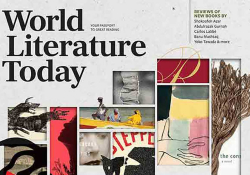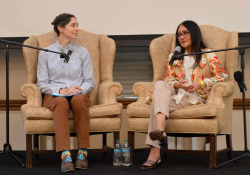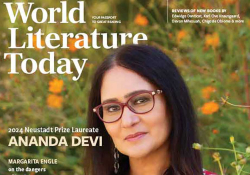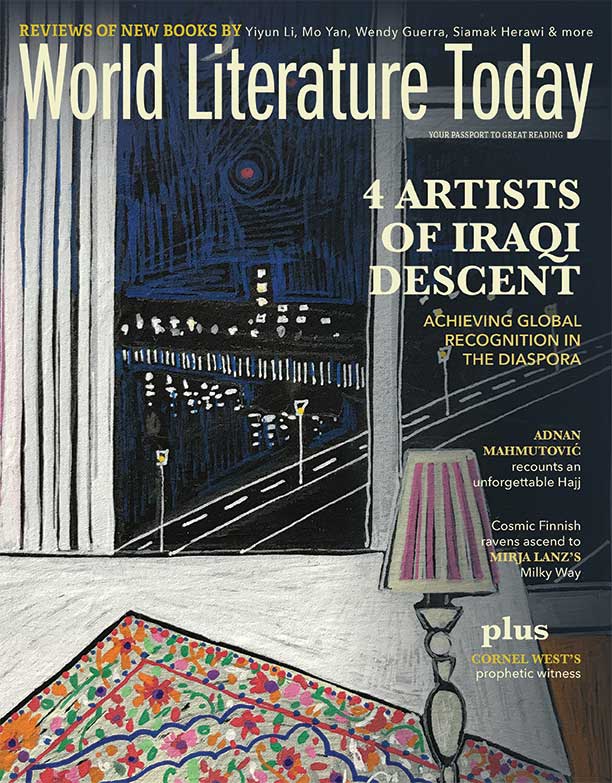Editor’s Note
A [literary] journal is the most elegant way to conspire.
—J. G. Cobo Borda, “Paz’s Workshop,” WLT (1982)
 I
I
n his recent book Little Magazine, World Form (2016), Eric Bulson makes a compelling case for little magazines’ role in the “globalization of modernism,” beyond the glittering metropolises of the US and western Europe, not only in the 1920s but well into the late twentieth and early twenty-first centuries as a “digittle” form. The story of those editors—Monroe, Anderson, Pound, Eliot—who became the impresarios of anglophone modernism is well known, but Bulson argues that the material form of the magazine itself helped create transnational—and in many cases oppositional—literary networks in such places as Japan, India, Uganda, Jamaica, and Argentina. Bulson lists many of the names that little magazines were known by in these countries, including rivista, revista, periódico, zhurnal, zeitschrift, dōjin zasshi, tidsskrift, samizdat, folyóirat, and patrika.
As was the case with books and newspapers, the explosive democratization of print technologies in the late nineteenth century made the globalization of the magazine form possible. In terms of oppositional networks, Bulson contends that little magazines, in particular, were “decommercialized, decapitalized, and decentered,” which facilitated their distribution despite the nascent fascisms and Stalinism of the interwar years, and in solidarity with the anticolonial movements that toppled imperial regimes in the 1950s and ’60s. As I wrote in my editor’s note introducing the July 2023 issue, Norman, Oklahoma, was simultaneously both decentered and transnational when Roy Temple House decided to found Books Abroad here in 1927.
It is clear from the pages of Books Abroad and its correspondence archives that Dr. House had his finger on the pulse of other little magazines throughout Europe, the Americas, and beyond and—in his own efforts to establish an enduring editorial formula—found kindred spirits in the work of such editors as Italy’s Benedetto Croce (La Critica), Argentina’s Victoria Ocampo (Sur) and Jorge Luis Borges (Proa), Senegal’s Alioune Diop (Présence Africaine), Mexico’s Octavio Paz (Taller), and Cuba’s José Lezama Lima (Orígines). From 1927 to 1948, House drew inspiration and enlightenment from his fellow editors to bring the work of foreign writers to Books Abroad’s pages and to the attention of its anglophone readership.
That inspiration stayed constant throughout the second half of the twentieth century and remains true in 2023: journals from the US and abroad, many of them in deluxe print editions, still make their way to our offices, including the Armenian Review, based in Watertown, Massachusetts; Banipal, a UK publication devoted to Arab lit; Colóquio Letras, focused on Portuguese lit; Jaunā Gaita, from Latvia; the elegant Korean Literature Now, published in Seoul; the legendary Transition, a “magazine of Africa and the diaspora”; and many more. Moreover, many fine translation-focused lit mags, like Two Lines, Circumference, Words Without Borders, and Asymptote, share WLT’s commitment to enlarging the scope of world literature beyond the predominance—some would say the hegemony—of English.
For Bulson, modern print practices helped transform Goethe’s nineteenth-century ideal of Weltliteratur (world literature) into a twentieth-century transnational literary network “open to writers and critics everywhere.” In the current issue of WLT, Egyptian novelist Ahmed Naji discusses his new prison memoir, Rotten Evidence, translated by Katharine Halls, and contends that in writing about the role of dreams and humor in prison life, he hopes to “push people to think about the unthinkable” in new ways (page 33). Little magazines, which still operate in the interstices of a mostly commercialized, capitalized, and urban-centered literary marketplace, invite readers to unthink what they know and to broaden their ideas of what an international Republic of Letters might look like.
Daniel Simon









